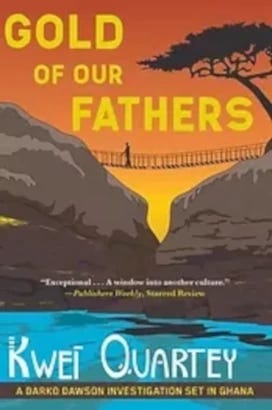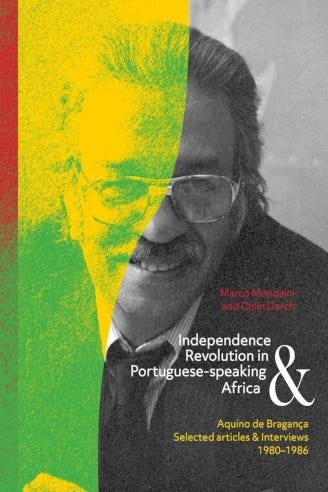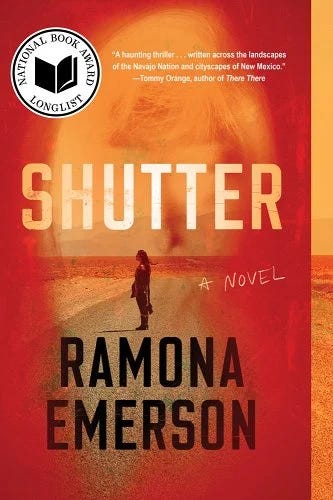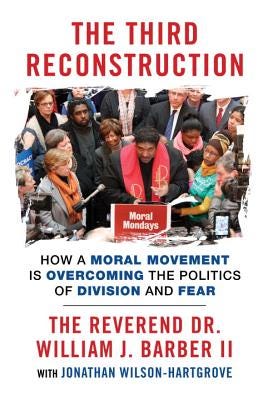AfricaFocus Notes on Substack offers short comments and links to news, analysis, and progressive advocacy on African and global issues, building on the legacy of over 25 years of publication as an email and web publication archived at http://www.africafocus.org. It is edited by William Minter. Posts are sent out by email once or twice a month. If you are not already a subscriber, you can subscribe for free by clicking on the button below. More frequent short notes are available at https://africafocus.substack.com/notes, and are also available in an RSS feed.
The 12 books highlighted in this post are books I am currently reading or hope to read soon that I think might be of interest to AfricaFocus subscribers. The images and links are most often to Bookshop.org, which I highly recommend as an alternative to Amazon to readers who buy books in the United States or the United Kingdom. Bookshop.org shares its surplus income with independent bookstores, and has raised over $34 million for that since it was founded four years ago.
However, these days I hardly ever buy physical books, and only occasionally digital ones that I am particularly interested in. Living in Mount Pleasant, in Washington, DC, I am fortunate in having a good public library as well as an abundance of Little Free Library kiosks in the neighborhood, which supply my addiction to reading mystery novels and thrillers with a sense of place. Non-fiction books I want to read are harder to come by, since I have no access to a university library system. But an annual subscription to Perlego for $144 provides unlimited digital access to a library of over a million academic books.
See the end of this post for more suggestions on finding sources for books in libraries or from online sources.
12 Books (8 Non-Fiction and 4 Fiction)
The Green New Deal from Below, by Jeremy Brecher.
The Barn, by Wright Thompson.
Gold of Our Fathers, by Kwei Quartey.
Independence and Revolution in Portuguese-Speaking Africa, by Aquino de Bragança.
Revolt of the Rich, by David Gibbs.
Shutter, by Ramon Emerson.
The Sum of Us, by Heather McGee.
The Third Reconstruction, by the Reverend Dr. William J. Barber II.
The Wrong Side, by Robert Bailey.
Power Concedes Nothing, edited by Linda Burnham, Max Elbaum, & Maria Poblet.
Winners Take All, by Anand Giridharadas.
Hold Your Breath, China, by Qiu Xiaolong.
Green New Deal from Below
One of the most optimistic books I have read this year. Despite national trends, there is positive action at the level of cities, states, and local institutions, such as universities, local school boards, and more. While individual action on climate may be only performative, when people work together it can add up.
The Green New Deal has been largely blocked at the national level, but it is thriving in communities, cities, and states. Some of the most impressive implementations of its principles and policies are occurring at a municipal level. In cities throughout the United States, new political formations, often but not always under the banner of the Green New Deal, are creating a new form of urban politics. They pursue the Green New Deal’s core objectives of fighting climate change in ways that produce good jobs and increase equality based on coalitions of activists from impoverished neighborhoods, disempowered racial and ethnic groups, organized labor, and advocates for the environment. These coalitions engage widespread democratic mobilization. In this chapter I examine Green New Deal–style programs developing in Boston, Los Angeles, and Seattle, and review other programs and policies being adopted in cities around the country that use climate protection as a vehicle for creating jobs and challenging injustice.
The Barn
The Barn: The Secret History of a Murder in Mississippi
By Wright Thompson
Review by Aram Goudsouzian
Aram Goudsouzian is the Bizot Family Professor of History at the University of Memphis. His books include “Down to the Crossroads: Civil Rights, Black Power, and the Meredith March Against Fear.”
September 18, 2024
https://www.washingtonpost.com/books/2024/09/18/barn-emmett-till-wright-thompson-review/
An extraordinary new history of Emmett Till, Mississippi and America
Wright Thompson’s deep meditation on the notorious murder in his home state revolves around an artifact hiding in plain sight: the barn where Till was killed.
Why are we still haunted by the ghost of Emmett Till? He died in 1955 and we keep revisiting his tale, reckoning with its tormented history.
Is it because his murder was so monstrous? Till, a 14-year-old Black boy from Chicago who was visiting relatives in the Mississippi Delta, had some kind of encounter with a White woman named Carolyn Bryant in the grocery store Bryant’s family owned. Bryant alleged that Till forcefully grabbed her, though others there said he only whistled in her direction. For this breach of racial etiquette, he was abducted, tortured, shot in the head, tied by his neck to a cotton-gin fan and dumped in the Tallahatchie River.
Or is it because that murder launched a movement? At his memorial in Chicago, Till’s mother, Mamie, insisted on an open casket so that the world could see what had been done to her son. Later that year, Rosa Parks refused to relinquish her bus seat in Montgomery, Ala., and she claimed that she was thinking of Emmett Till as she did it. At the dawn of the ’60s, when a nonviolent army of young Black activists integrated lunch counters and bus stations and voting booths, some called themselves the “Emmett Till Generation.”
For Wright Thompson, the murder still matters in part because so many facts have stayed buried, and because those silences have widened the cracks in our democratic bedrock. His extraordinary new book, “The Barn,” is not only an intimate history of the tragedy, but also a deep meditation on Mississippi and America. It revolves around an artifact hiding in plain sight: the barn where Till was beaten and killed.
“The more I looked at the story of the barn and came to understand the forces that moved everyone involved into the Mississippi Delta in 1955,” Thompson writes, “the more I understood that the tragedy of humankind isn’t that sometimes a few depraved individuals do what the rest of us could never do. It’s that the rest of us hide those hateful things from view, never learning the lesson that hate grows stronger and more resistant when it’s pushed underground.”
...
In Thompson’s telling, layers of the Delta’s history fold upon themselves, mixing the sublime and gruesome. Blood stains its rich alluvial soil. Dockery Plantation, where Charley Patton birthed the blues, lies a few miles down Drew Ruleville Road from Leslie Milam’s barn. Three miles east, the great White quarterback Archie Manning (father of Peyton and Eli) grew up in what he frequently called an idyllic “Mayberry,” never realizing his proximity to the murder.
While tracing the entangled family trees of the Milams and Bryants, Thompson sketches the roughshod world of the region’s White working class. As their economic prospects grew fraught, members of that class clung to their violent codes and racial privilege. Remarkably, at the trial, eight of the jurors, a defense attorney and the sheriff all hailed from the same extended family as Milam and Bryant.
“The Barn” describes not just the poison of silence and lies, but also the dignity of courage and truth. If not for Willie Reed, the Black teenager who testified that he witnessed the truck with Till and seven kidnappers in it, the conspirators would have remained anonymous. If one White deputy sheriff had not adhered to the wishes of Till’s mother, her son would have been buried in Mississippi and the world would never have seen what happened to him.
Gold of Our Fathers
One of the best in the Darko Dawson series by Kwei Quartey. He also has another series focused on PI Emma Djan.
Darko Dawson has just been promoted to chief inspector in the Ghana police service—and it even comes with a (rather modest) salary bump. But he doesn’t have much time to celebrate, because his new boss is transferring him from Accra, Ghana’s capital, out to remote Obuasi in the Ashanti region, an area notorious for the illegal exploitation of its gold mines.
When Dawson arrives at the Obuasi headquarters, he finds it in complete disarray. The office is a mess of uncatalogued evidence and cold case files, morale is low, and discipline among officers is lax. Then, on only his second day on the job, the body of a Chinese mine owner is unearthed in his own gold quarry. As Dawson investigates the case, he quickly learns how dangerous it is to pursue justice in this kingdom of illegal gold mines, where the worst offenders have so much money they have no fear of the law.
For more background on illegal gold mining in Ghana, and the Ghanaians, Chinese, and other foreigners who profit by it, see
https://www.miningcom/web/hundreds-march-against-ghanas-damaging-informal-gold-mining-boom/
Aquino de Bragança
Tomaz Aquino de Bragança, a close adviser to former Mozambican president Samora Machel, dedicated his life to the liberation struggles of southern Africa. Before his death in a plane crash (along with President Machel) in 1986, he was a journalist, an academic, a diplomat, and a public intellectual known for his skill in sensitive and discreet political negotiation, most notably his role in Mozambique’s revolution and independence from Portugal in 1975. Marco Mondaini and Colin Darch present a selection of Aquino’s post-independence writings and interviews, many published here in English for the first time. They also provide a general introduction to Aquino’s life and thought and short introductions to the texts. The result is both a compelling glimpse into the inner workings of several liberation movements and a window on the development of Aquino’s thinking around issues of independence, nationalism, and the character of the struggles.
Revolt of the Rich
Highly recommended. Insightful and well-documented, as are earlier historical studies by David Gibbs on the Congo, Yugoslavia, and Afghanistan. See more about his work at his website (https://dgibbs.arizona.edu/).
Inequality in the United States has reached staggering proportions, with a massive share of wealth held by the very richest. How was such a dramatic shift in favor of a narrow elite possible in a democratic society? David N. Gibbs explores the forces that shaped the turn toward free market economics and wealth concentration and finds their roots in the 1970s. He argues that the political transformations of this period resulted from a "revolt of the rich," whose defense of their class interests came at the expense of the American public.
Drawing on extensive archival research, Gibbs examines how elites established broad coalitions that brought together business conservatives, social traditionalists, and militarists. At the very top, Richard Nixon's administration quietly urged corporate executives to fund conservative think tanks and seeded federal agencies with free-market economists. Even Jimmy Carter's ostensibly liberal administration brought deregulation to the financial sector along with the imposition of severe austerity measures that hurt the living standards of the working class. Through a potent influence campaign, academics and intellectuals sold laissez-faire to policy makers and the public, justifying choices to deregulate industry, cut social spending, curb organized labor, and offshore jobs, alongside expanding military interventions overseas.
Shutter
Rita Todacheene is a forensic photographer working for the Albuquerque police force. Her excellent photography skills have cracked many cases--she is almost supernaturally good at capturing details. In fact, Rita has been hiding a secret: she sees the ghosts of crime victims who point her toward the clues that other investigators overlook.
As a lone portal back to the living for traumatized spirits, Rita is terrorized by nagging ghosts who won't let her sleep and who sabotage her personal life. Her taboo and psychologically harrowing ability was what drove her away from the Navajo reservation, where she was raised by her grandmother. It has isolated her from friends and gotten her in trouble with the law.
And now it might be what gets her killed.
When Rita is sent to photograph the scene of a supposed suicide on a highway overpass, the furious, discombobulated ghost of the victim--who insists she was murdered--latches onto Rita, forcing her on a quest for revenge against her killers, and Rita finds herself in the crosshairs of one of Albuquerque's most dangerous cartels. Written in sparkling, gruesome prose, Shutter is an explosive debut from one of crime fiction's most powerful new voices.
The Sum of Us
When McGhee asks, at the outset, “Why can’t Americans have nice things?” she means the basics: good roads, well-funded schools, affordable health care, decent housing, clear air and water, jobs that pay a living wage. We can’t have nice things because white America would rather go without than invite Black America in. Over the past five decades, life has increasingly come to be seen as a zero-sum competition. We’ve been deluded to believe that what’s provided for one group must necessarily be denied another. The richest nation on earth suffers from a scarcity mindset, because of racism.
It was not always so. “In the mid-1960s,” writes McGhee, “the American Dream was as easy to achieve as it ever was, or has been since, with good union jobs, subsidized home ownership, strong financial protections, a high minimum wage, and a high tax rate that funded American research, infrastructure, and education.” An economy that looked, as she describes it, like a football — “fat in the middle” and thin at both ends. Now, 50 years later, it looks like a bow tie, with a hollowed-out middle, and “bulging ends of high- and low-income households.” - review by Sheela Clary in The Berkshire Edge
The Third Reconstruction
North Carolina pastor Barber is one of the prophets of our time. But he is not the only person seeing the time we are in as the Third Reconstruction, after the original one following the Civil War and the civil rights movement of the mid 20th-century.
For a list of 10 books with this theme, including the original Black Reconstruction by W.E.B. DuBois, see https://bookshop.org/lists/third-reconstruction.
The Wrong Side
Robert Bailey´s novels are set in Pulaski, Tennessee (the birthplace of the Ku Klux Klan) and the state of Alabama just to the south of Pulaski. The protagonist of one series is Black lawyer Bocephus Haynes.
Teen pop star Brittany Crutcher is found dead in small-town Tennessee. For attorney Bocephus Haynes, it’s just another night in Pulaski. Bo swore off criminal work after his last case, but the beloved singer’s murder demands answers.
The prime suspect is local high school football hero and the victim’s boyfriend, Odell Champagne. However, this fallen athlete is one of Bo’s son’s best friends. Bo knows this young man and does not believe him capable of the crime.
When Odell is charged with murder, Bo reluctantly takes the case, sparking outrage throughout the town. But as Bo follows the evidence, he learns that the victim made decisions in her last hours that would give powerful forces motive to harm her. Feeling mounting pressure from the community and the DA, Bo forges ahead. But as the seconds count down, he wonders whether justice is even possible.
Power Concedes Nothing
This book is an analysis of the 2020 election in key states, including Georgia, Michigan, Arizona, Virginia, Florida, and Pennsylvania, as well as essays on the role of communities of color, workers, democratic socialism, and grassroots mobilization. Still relevant in terms of thinking ahead for 2026 and 2028.
The November 2020 US election was arguably the most consequential since the 1860 election of Abraham Lincoln—and grassroots leaders and organizers played crucial roles in the contention for the presidency and control of both houses of Congress. Power Concedes Nothing recounts these on-the-ground efforts that mobilized a record voter turnout in 2020.
Writers and interviewees in this volume include Cliff Albright, Larry Cohen, Neidi Dominguez, David Duhalde, Alicia Garza, Ryan Greenwood, Arisha Hatch, Jon Liss, Andrea Cristina Mercado, Maurice Mitchell, Rafael Návar, Deepak Pateriya, Ai-jen Poo, Art Reyes III, Nsé Ufot, and Mario Yedidia.
Winners Take All
Anand Giridharadas, publisher of The Ink, is one of the most astute commentators writing today on U.S. politics. His blog often features other voices as well as his own.
This book, published in 2018, takes us into the inner sanctums of a new gilded age, where the rich and powerful fight for equality and justice any way they can—except ways that threaten the social order and their position atop it. They rebrand themselves as saviors of the poor; they lavishly reward “thought leaders” who redefine “change” in ways that preserve the status quo; and they constantly seek to do more good, but never less harm.
Giridharadas asks hard questions: Why, for example, should our gravest problems be solved by the unelected upper crust instead of the public institutions it erodes by lobbying and dodging taxes? His groundbreaking investigation has already forced a great, sorely needed reckoning among the world’s wealthiest and those they hover above, and it points toward an answer: Rather than rely on scraps from the winners, we must take on the grueling democratic work of building more robust, egalitarian institutions and truly changing the world—a call to action for elites and everyday citizens alike.
Hold Your Breath, China
Veteran Shanghai inspector monitors a potentially dangerous group of environmental activists while his sidekick matches wits with a serial killer.
Though lately out of favor with the Communist Party, Chief Inspector Chen Cao is still the man to call when a serial killer is baffling Shanghai police. New victims are appearing every week. Chen is intrigued enough to take the case even though he’s been assigned a much more complex task, one suited to his poetic soul. With the air pollution worsening in Shanghai, the government is worried about the increasing power of an attractive activist named Yuan Jing and particularly about the documentary film she is preparing. Comrade Secretary Zhao wants Chen to collect as much damaging information on her as he can. When Chen shares these new assignments with his partner, Detective Yu Guangming, they agree to split the two cases, Yu handling the murder probe and Chen digging into Yuan’s world. Though forensic evidence indeed points to a serial killer, Yu can’t figure out the common denominator among the victims or the motive for the murders. Chen’s investigation prompts him to compose poetry with an environmental theme. As Yu aggressively assembles the evidence explaining the murders, he shares his progress with Chu, who succeeds in infiltrating Yuan Jing’s group but has a hard time squaring his ethics with Zhao’s desires.
Checking Availability Online
Install the library extension in Chrome - https://www.libraryextension.com/
This can identify books in your local library.
Visit the online library on the Internet Archive - https://archive.org/details/books Millions of books can be borrowed for an hour at a time (and renewed) to be scrolled through page by page. When copyright permits, books can be downloaded as PDFs or in other digital formats.
Amazon's Kindle books are not limited to people having a physical Kindle. They can also be read in a computer browser on the web or on a mobile phone.
Many other books are available open-access for downloading or reading in a browser from many websites of publishers, authors, and content specialists on almost any subject.
















